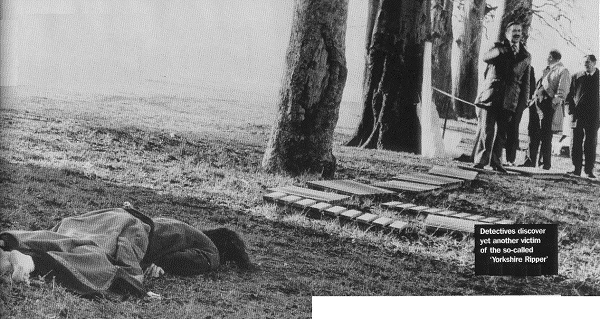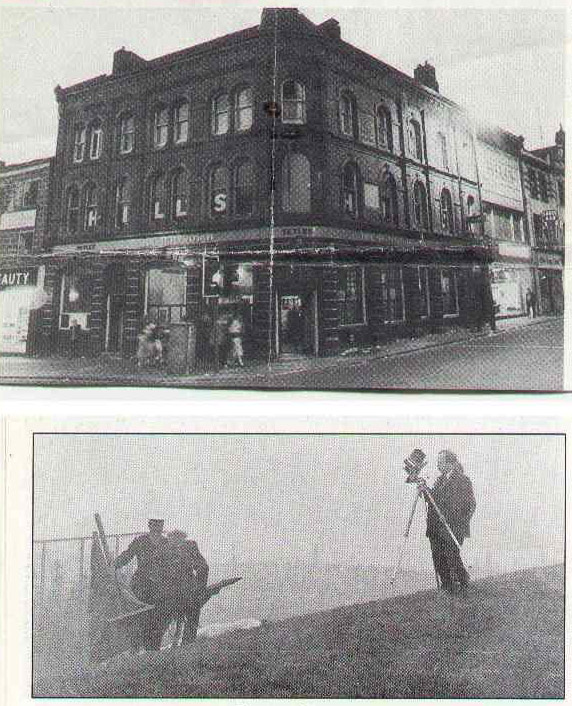December 03, 2008
'Can the world be as sad as it seems?': David Peace and negative theodicy

- "Faced with the terrible brutality in these books - and again, this isn't a particularly popular idea at the moment - I strongly think you have to believe in God, that there's something better within us all and something worth saving that will triumph in the face of whatever you're put through."
- - David Peace, interviewed in New Statesman, 2001
Rereading David Peace's Red Riding Quartet (three of which have just been filmed by Channel 4), it seems to me that the four books constitutes not so much a negative theology as a negative theodicy. The religious elements in the books become increasingly foregrounded as the Quartet develops, until the deeply ambiguous, hallucinatory ending of Nineteen Eighty Three becomes a quasi-Gnostic treatise on evil and suffering. The final section of the novel, "Total Eclipse Of The Heart" (that transfiguration of pop cultural reference into epigraph being one of Peace's signature techniques) explicitly posits the idea that, far from undermining the existence of God, evil and suffering entail that God must exist. Eclipse implies something that is eclipsed, a hidden source of light that produces all this shadow. It resembles Kant's moral argument for the existence of God, which is, in effect, an inversion of the problem of evil. The problem of evil maintains that suffering, particularly suffering visited upon the innocent, means that the theistic God could not exist, since a benevolent, omnipotent and omniscient being would not countenance undeserved suffering. With his inventory of wretched child abuse cases, Dostoyevsky's Ivan Karamazov makes the most famous, and most passionate, statement of this position. Yet if there is no God, the suffering remains, only now there is no possibility of its expiation; if there can no justice to come, the universe is permanently blighted, irrevocably scarred by atrocity, abuse and torture. Kant's solution relies upon an argument from longing: our yearning for justice insists that this cannot be enough, that appalling suffering cannot go unexpiated. There must be justice, and only God is in the position to deliver it.
All of these themes are touched upon in Dominic's recent post on Meillassoux and Divine Inexistence. (See also this on Speculative Heresy.) Meillassoux's solution to the problem of evil is a God-to-come: a God who has not been tainted by responsibility for causing and/ or permitting suffering, but who has the power to resurrect (and reward) the dead.
Peace, who has said that he aimed to produce a Crime fiction which is no longer entertainment, has written Crime works that are hauntological in a double sense. The Crime genre is of course well suited to explore the (moral, existential, theological) problems posed by Meillassoux's “odious deaths”: the deaths "of those who have met their end prematurely, whose death is not the proper conclusion of a life but its violent curtailment"; and as they moved away from the uneasy combination of fanciful genre trappings, period signifiers, Angry Young Man homage and brutality that characterised Nineteen Seventy Four, the novels of the Red Riding Quartet were simultaneously drawn towards actuality and theology, as if the proximity of the one entailed the other. Readers are put into the position of spectral mourners by the voices of those who have died odiously, the Ripper's victims, heard in the visionary "Transmissions" which preface each of the chapters in Nineteen Eighty, sections which precisely combine the actual (gleaned from reportage and biography) with the spectral.

The novels are hauntological in another sense, a sense that is closer to the way in which we have used it in relation to music, but not quite the same. Peace is not at all interested in the problems of degraded memory which preoccupy The Caretaker, Burial or Basinski. His is a past without crackle, rendered in the first person in a tense that is very nearly present. The occlusions in the narrative are due, not to faulty recording devices or memory disorders (cultural or personal) but to the self-blindings of his characters, who see themselves (and the events of which they are a part) only through a glass darkly. In the end, everything - narrative, intelligibility - succumbs to total murk; as the characters begin to disassociate, it becomes difficult to know what is happening, or what has happened; at a certain point, it is unclear as to whether we have crossed over into the land of the dead.
The libidinal orientation towards the past is also markedly different in the case of Peace and sonic hauntology: whereas hauntological music has emphasised the unexplored potentials prematurely curtailed in the periods it invokes, Peace's novels, as we have seen, are driven by the unexpiated suffering of Yorkshire at the end of the 70s. And Peace's writing is also hauntological in its intuition that particular places are stained by particular occurrences (and vice versa). As he has insisted in many interviews, it is no accident that Sutcliffe was the Yorkshire Ripper. Whereas hauntological music interrogates nostalgia, Peace's books are avowedly anti-nostalgic: counterparts to Life On Mars, perhaps, with its ambivalence towards police brutality (and its media representation). There is no such vindication in Peace's novels, no suppressed yearning for a time in which coppers could beat suspects with impunity. After all, it is corruption, rather than criminality per se, that is the focus of the Red Riding Quartet.
Music in Peace's books functions as a hauntological trigger. He's remarked that he uses music, including music he doesn't like, to take him back to the feel, the grain, of a period. Musical references are embedded in the text either diegetically, as background sound, or more esoterically, as cryptic-epigraphic ciphers and repeated incantations: a portal effect going that gratifyingly echoes (in reverse) the way in which music of the 1970s, especially postpunk, would direct listeners to fiction. (Reading the books alongside Tom Ewing's Popular just now makes for some interesting juxtapositions since Popular has reached the core chrono-zone of Peace's quartet - Nineteen Eighty is shadowed by Lennon's death, and this one makes it into Nineteen Seventy Seven, its disco chirpiness oddly congruous with Peace's landscape of vice and sleaze.) As others have noted, Nineteen Eighty is haunted in particular by Throbbing Gristle, especially the phrase that they took from another killer, Charles Manson: "can the world be as sad as it seems? " In Peace's hands, this question becomes an urgent theological enquiry, the very relentlessness of the sadness and misery he recounts calling forth an absent God, a God who is experienced as absence, the great light eclipsed by the world's unending tears. The deeply ambivalent TG-esque preacher Reverend Laws (who, TG-like, replaces "I" with "E" and "the" with "thee") may be the one who can put us in touch with this God, the Abandoned Christ who is himself forsaken, the redeemer who is not the creator. But the world, the sad, desolated world, is full of angels whose wings have either been shorn off, reduced to stubble, or which have grown into gigantic, dirty monstrosities... addict angels hooked on alcohol, casual but incessant lusts, and the trash of the consumer society that is struggling to be born out of the wreckage of the Fordist social consensus... angels whose ultimate response to the world is puking (everyone pukes in Peace's books), throwing up the whiskies and the undercooked crispy pancakes, but never being able to purge any of it, never being able to take flight.
Posted by mark at December 3, 2008 12:20 PM | TrackBack